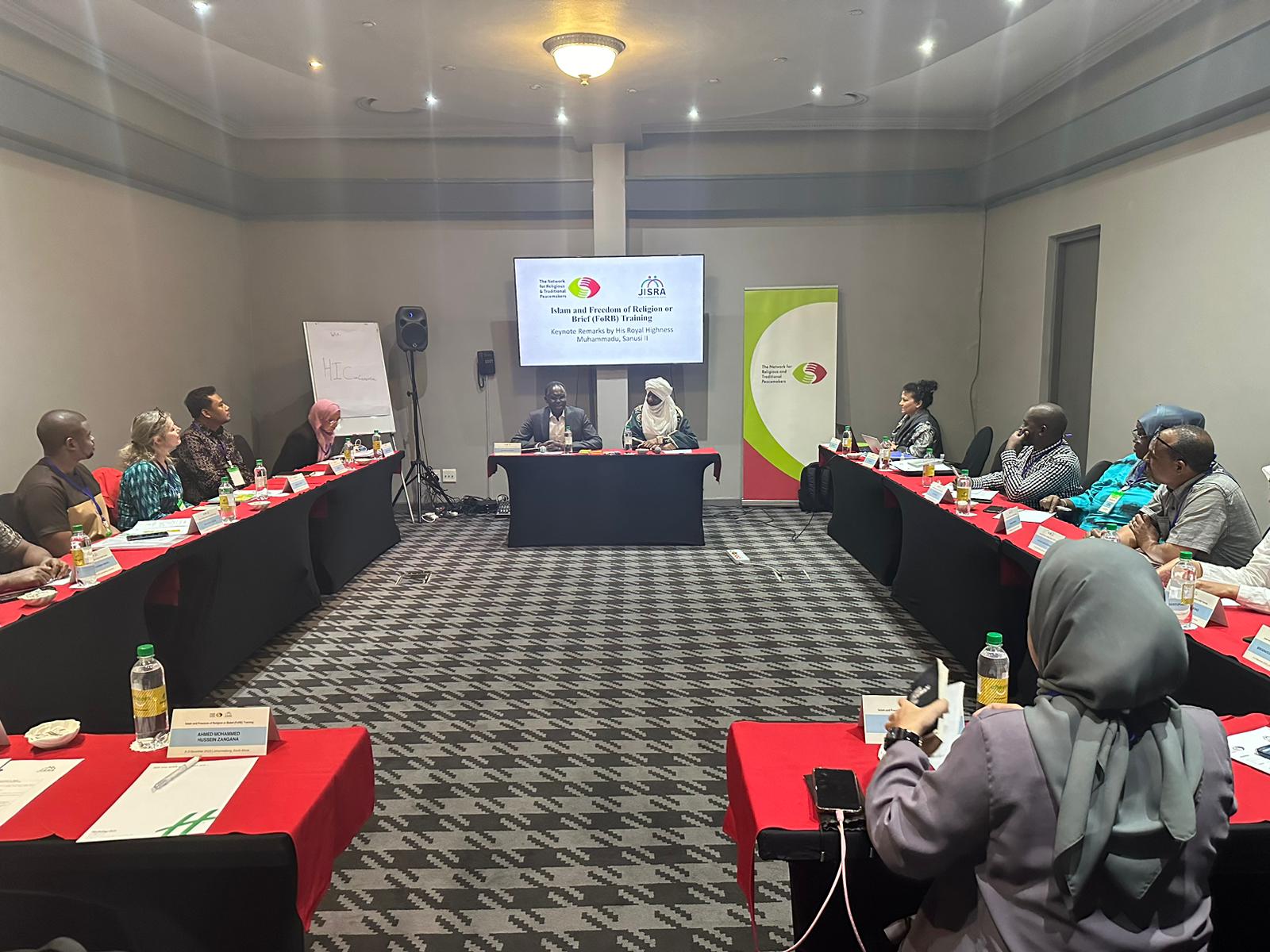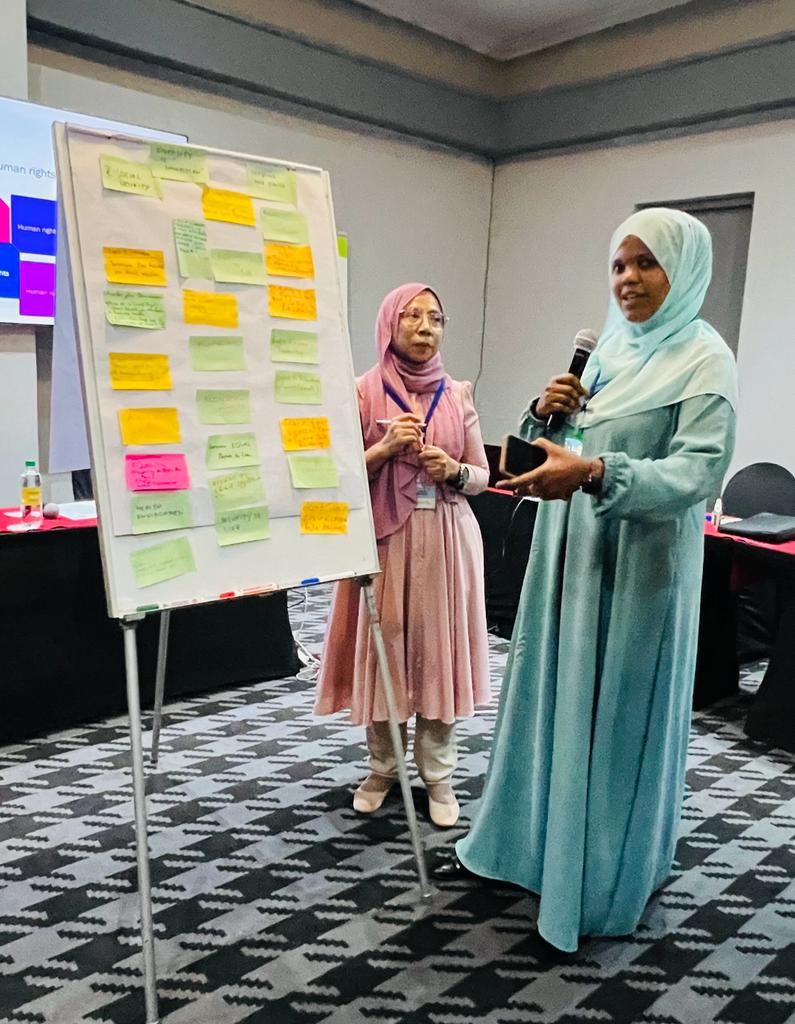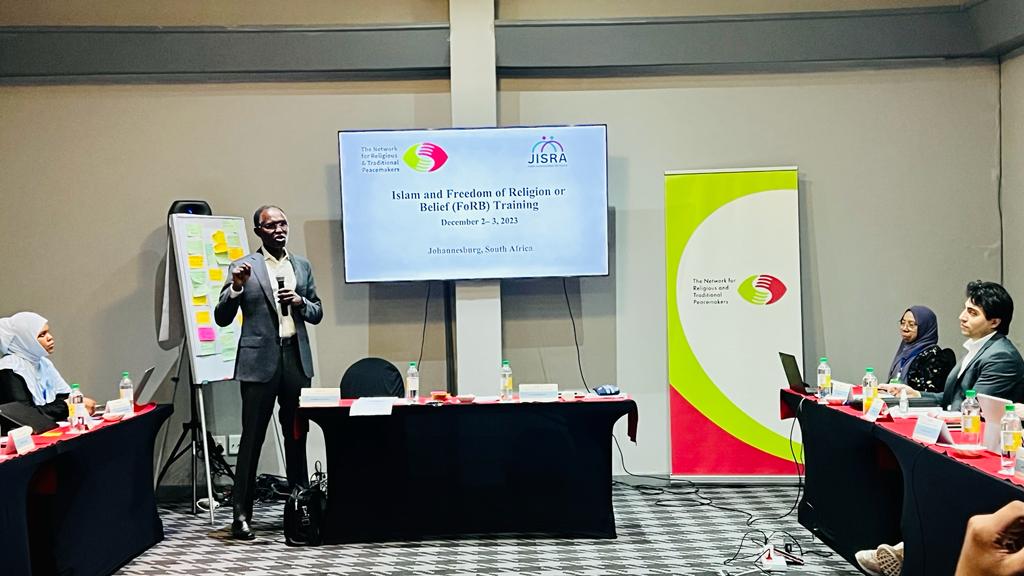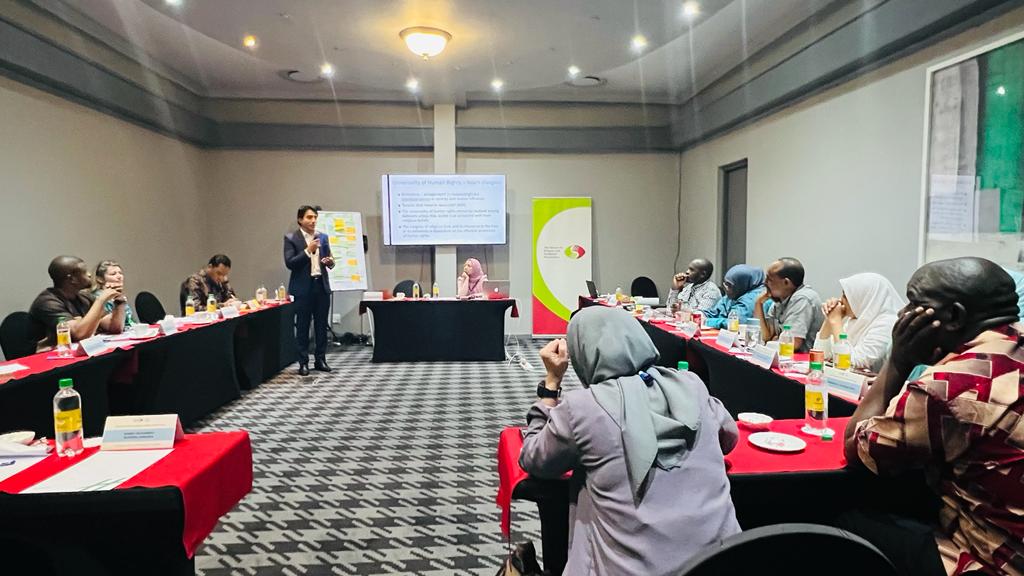Islam and Freedom of Religion or Belief: Advancing Media Literacy
Training | December 2023

First day of Islam and FoRB training with Dr. Mohamed Elsanousi and His Royal Highness, Muhammadu Sanusi II sharing opening remarks in Johannesburg, South Africa.
On December 2-3, the Peacemakers Network organized a religious literacy training, focusing on Islam and Freedom of Religion or Belief (FoRB) in Johannesburg, South Africa, as part of the implementation of the 5-year Dutch fund program, Joint Initiative for Strategic Religious Action (JISRA). The training brought together 16 local actors currently engaged in the JISRA program from Ethiopia, Indonesia, Kenya, Mali, and Uganda, selected through an inclusive and gender-balanced process. The training enhanced their understanding of Islamic theology and jurisprudence, providing them with the necessary capacity to achieve their goals in their respective countries.
The first day of the training session concentrated on enhancing the participants’ understanding of Islam and Freedom of Religion or Belief (FoRB), providing them with a better grasp of the diverse schools of thought within Islam. The principles of FoRB in Islam are derived from various sources within Islamic texts and traditions, encompassing different schools of thought, each offering distinct interpretations. Despite this diversity, the training incorporated three primary sources: the Quran, the Hadith (actions and sayings of Prophet Muhammad), and Islamic jurisprudence (Fiqh) alongside broader principles of justice. Simultaneously, the course emphasized the necessity for contemporary discussions around FoRB within Islam and understanding Islamic teachings to be context specific. Islam, being a global religion, is not monolithic; its teachings and practices vary based on region, country, and even, at times, within communities.

Participants sharing their learnings about human rights in Islam.

Dr. Mohamed Elsanousi, Executive Director of the Peacemakers Network kicks off the training.

Peacemakers Network Secretariat member Siam Tooran presenting on the Universal Declaration on Human Rights.
His Royal Highness, Muhammadu Sanusi II, the 14th Emir of Kano and Former Governor of the Central Bank of Nigeria delivered a lecture on the state of FoRB in Muslim-majority countries. His Royal Highness reflected on his experiences, including his time as the Emir of Kano, shedding light on the challenges he faced in advancing FoRB within his specific context.
The second day delved into how various Islamic schools of thought and Muslim scholars have developed frameworks, based on the Quran and Hadith, to advance FoRB in Muslim-majority countries. Particular attention was given to the Marrakesh Declaration (2016), issued by over three hundred Muslim scholars, politicians, activists, and interfaith observers as a unified response to the persecution and violence against ethnic and religious minorities in Muslim-majority states. The legal foundation of the Declaration rests on the Charter of Medina (7th Century), written by Prophet Mohammed, affirming equal citizenship and coexistence as Islamic doctrines and traditional forms of governance. The training concluded with participants developing context-specific recommendations on how to implement the Declaration within their respective communities. Moving forward, the Peacemakers Network will organize a series of regional consultations to explore further ways to implement the Marrakesh Declaration.
The Peacemakers Network is a member of the Joint Inter-Religious Action (JISRA) consortium, an interfaith and secular partnership promoting Freedom of Religion and Beliefs (FoRB). The consortium, consisting of Catholics, Confucians, Hindus, Muslims, and Orthodox partners, collaborates with local civil society organizations in Ethiopia, Indonesia, Iraq, Kenya, Mali, Nigeria, and Uganda. The focus is on empowering religious leaders to become agents of change in their respective contexts as promoters of FoRB. The consortium comprises Mensen Met Een Missie, Tearfund, Search for Common Ground, Faith for Action, and the Network itself. JISRA is being implemented in collaboration with 50 local civil society organizations in Ethiopia, Indonesia, Iraq, Kenya, Mali, Nigeria, and Uganda, with additional support and advocacy efforts in Europe and the USA. This international, interreligious partnership is dedicated to advancing peaceful and just societies where all individuals can enjoy freedom of religion and belief (FoRB).
About the JISRA Project
JISRA echoes the Arabic word Jisr, meaning ‘bridge’ and symbolizes the connection the program will make between divided communities. The goals of the JISRA project are to (1) work within religious communities to challenge discrimination, extremist tendencies, and hate towards others; (2) Facilitate and strengthen bridges between religious communities by encouraging interreligious action and addressing common grievances and (3) engage with local, national and international authorities to make state action towards religious freedom more effective and to challenge divisive policies and practices.
Follow the Network on social
